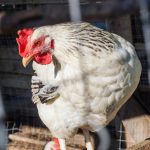Cold weather can have a significant impact on chickens, affecting their health, egg production, and overall well-being. When temperatures drop, chickens can experience stress, decreased egg production, and even frostbite if not properly cared for. Chickens are more susceptible to cold weather than other farm animals due to their small body size and lack of insulation. It’s important for chicken owners to understand the impact of cold weather on their flock in order to provide the necessary care and protection during the winter months.
Chickens are more sensitive to cold temperatures than they are to heat. When temperatures drop below freezing, chickens can experience stress and discomfort, which can lead to a decrease in egg production. In extreme cold, chickens may even stop laying eggs altogether. Additionally, cold weather can increase the risk of frostbite, especially on the comb and wattles of chickens. It’s important for chicken owners to be aware of the signs of frostbite and take measures to prevent it from occurring. Understanding the impact of cold weather on chickens is crucial for providing the necessary care and protection to ensure the health and well-being of your flock during the winter months.
Table of Contents
- 1 Creating a Cozy Coop: Tips for Insulating Your Chicken Coop
- 2 Feeding Your Flock: Nutritional Needs for Winter
- 3 The Importance of Proper Ventilation in the Coop
- 4 Providing Additional Heat Sources for Your Chickens
- 5 Protecting Your Flock’s Feet from Frostbite
- 6 Monitoring Your Flock’s Health During the Winter Months
Creating a Cozy Coop: Tips for Insulating Your Chicken Coop
Insulating your chicken coop is essential for providing a warm and cozy environment for your flock during the winter months. Proper insulation can help regulate the temperature inside the coop, keeping it warm and comfortable for your chickens. There are several ways to insulate a chicken coop, including adding insulation to the walls, ceiling, and floor, as well as sealing any drafts or gaps that could let cold air in. It’s important to insulate the coop properly to ensure that your chickens stay warm and healthy throughout the winter.
One of the most effective ways to insulate a chicken coop is by adding insulation to the walls and ceiling. This can help trap heat inside the coop and prevent cold air from seeping in. Additionally, adding insulation to the floor can help keep the coop warm from the ground up. It’s also important to seal any drafts or gaps in the coop to prevent cold air from entering. This can be done by using weather stripping or caulking around windows, doors, and vents. By insulating your chicken coop properly, you can create a cozy and warm environment for your flock to thrive during the winter months.
Feeding Your Flock: Nutritional Needs for Winter
Feeding your flock the right diet is crucial for their health and well-being during the winter months. Cold weather can increase the energy requirements of chickens as they work harder to stay warm. It’s important to provide a balanced diet that meets their nutritional needs and helps them stay healthy and strong during the winter. This includes providing a high-quality layer feed that is rich in protein, vitamins, and minerals, as well as offering additional supplements such as scratch grains and mealworms to help keep your flock warm and healthy.
In addition to a balanced diet, it’s important to ensure that your flock has access to fresh water at all times. In cold weather, water can freeze quickly, so it’s important to check waterers regularly and provide warm water if necessary. You can also add electrolytes or apple cider vinegar to their water to help keep your flock hydrated and healthy during the winter months. Feeding your flock the right diet and ensuring they have access to fresh water is essential for their health and well-being during the colder months.
The Importance of Proper Ventilation in the Coop
Proper ventilation is crucial for maintaining a healthy environment inside the chicken coop during the winter months. While it may seem counterintuitive, good ventilation is essential for preventing moisture buildup and maintaining air quality inside the coop. Poor ventilation can lead to high humidity levels, which can increase the risk of respiratory issues and frostbite in chickens. It’s important to provide adequate ventilation in the coop while also preventing drafts that could make your flock uncomfortable.
One way to ensure proper ventilation in the coop is by installing vents near the roof or eaves to allow fresh air to enter while allowing stale air to escape. This can help regulate humidity levels and prevent moisture buildup inside the coop. It’s also important to keep bedding clean and dry to prevent mold and bacteria growth, which can be exacerbated by poor ventilation. By providing proper ventilation in the coop, you can help maintain a healthy environment for your flock during the winter months.
Providing Additional Heat Sources for Your Chickens
In some cases, providing additional heat sources may be necessary to keep your chickens warm during extreme cold weather. While chickens are generally well-equipped to handle cold temperatures, extreme cold can pose a risk to their health and well-being. There are several options for providing additional heat sources in the coop, including heat lamps, heated waterers, and heated perches. It’s important to choose the right heat source for your flock and ensure that it is used safely to prevent fire hazards.
Heat lamps are a popular option for providing additional warmth in the coop during cold weather. They can be hung from the ceiling or placed on a secure stand to provide heat from above. Heated waterers are also essential for preventing water from freezing, ensuring that your flock has access to fresh water at all times. Additionally, heated perches can help keep your chickens’ feet warm and prevent frostbite during cold nights. When using heat sources in the coop, it’s important to follow safety guidelines and ensure that they are installed securely to prevent any accidents or fire hazards.
Protecting Your Flock’s Feet from Frostbite
Frostbite is a common concern for chickens during cold weather, especially on their feet. To protect your flock from frostbite, it’s important to take measures to keep their feet warm and dry. This includes providing dry bedding, ensuring proper ventilation in the coop, and using heated perches if necessary. Additionally, you can apply petroleum jelly or a similar product to your chickens’ feet to help protect them from frostbite. It’s important to monitor your flock regularly for signs of frostbite and take action to prevent it from occurring.
In addition to protecting their feet from frostbite, it’s important to keep your flock’s coop clean and dry to prevent moisture buildup that could lead to frostbite or other health issues. This includes regularly cleaning bedding, removing wet or soiled bedding, and ensuring proper ventilation in the coop. By taking these measures, you can help protect your flock from frostbite and ensure their health and well-being during the winter months.
Monitoring Your Flock’s Health During the Winter Months
Monitoring your flock’s health is crucial during the winter months when they are more susceptible to cold weather-related issues such as frostbite and respiratory issues. It’s important to check your chickens regularly for signs of illness or injury and take action promptly if necessary. This includes checking for signs of frostbite on their combs, wattles, and feet, as well as monitoring their behavior and egg production for any changes that could indicate health issues.
In addition to regular health checks, it’s important to provide a clean and dry environment for your flock to prevent illness and injury during the winter months. This includes keeping bedding clean and dry, ensuring proper ventilation in the coop, and providing a balanced diet that meets their nutritional needs. By monitoring your flock’s health regularly and providing proper care and protection, you can help ensure that they stay healthy and strong throughout the winter months.
In conclusion, understanding the impact of cold weather on chickens is crucial for providing the necessary care and protection during the winter months. Creating a cozy coop with proper insulation, providing a balanced diet with additional supplements, ensuring proper ventilation, providing additional heat sources if necessary, protecting their feet from frostbite, and monitoring their health regularly are all essential for ensuring the health and well-being of your flock during cold weather. By taking these measures, you can help keep your chickens warm, healthy, and happy throughout the winter months.
Meet Walter, the feathered-friend fanatic of Florida! Nestled in the sunshine state, Walter struts through life with his feathered companions, clucking his way to happiness. With a coop that’s fancier than a five-star hotel, he’s the Don Juan of the chicken world. When he’s not teaching his hens to do the cha-cha, you’ll find him in a heated debate with his prized rooster, Sir Clucks-a-Lot. Walter’s poultry passion is no yolk; he’s the sunny-side-up guy you never knew you needed in your flock of friends!







